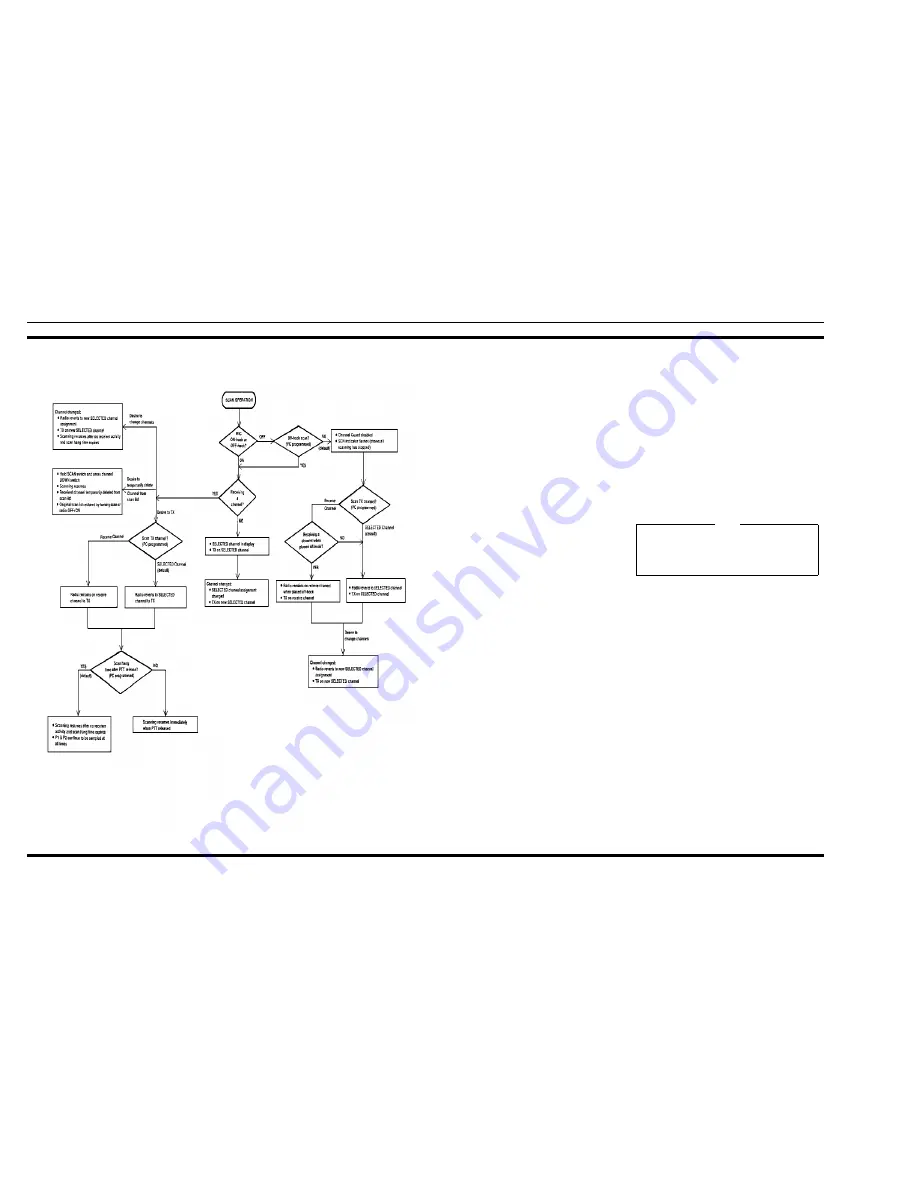
DETAILED SCAN OPERATION
The scan operation is controlled by the Logic Board, and
provides for scanning any or all of up to 16 channels. The
scanned channels may be located anywhere within the fre-
quency band of the radio, and can include two priority chan-
nels (P1 and P2).
If desired, all 16 channels can be scanned with or without
priority level. When SCAN is enabled, scanning of the selected
channels starts immediately. Scan time is approximately 15 to
160 milliseconds per channel, depending upon whether Chan-
nel Guard has been programmed for a particular scan channel.
If a carrier is not detected, the scan time is 15 milliseconds. If a
carrier is detected and Channel Guard is programmed for the
channel, time is 75-175 milliseconds, depending upon how
close the Channel Guard tone is to the desired tone. Typical
value is less than 175 milliseconds.
Priority 1 (P1) and Priority 2 (P2)channels, if present, are
not part of the non-priority channel scan list (SI, S2, S3,...) and
are treated separately. If there is no activity on any of the
scanned channels, then the scan sequence is as shown in the
following examples.
Example 1: (More than four Non-Priority channels,
i.e., six channels)
P 1-P2-S6-S5-S4-S3-P1-P2-S2-S1-S6-S5-P1-P2-S4-
S3-S2-S1I-P1-P2-...
Example 2: (Four or less Non-Priority channels, i.e.,
three channels)
P1-P2-S3-S2-S1-P1-P2-S3-S2-S1-P1-P2-S3-S2-S1-
PI-P2-S3-S2-S1-...
Therefore, the scan sequence is: Scan P1 and P2 if pro-
grammed. Then scan up to four non-priority channels before
scanning P1 and P2 again. If more than 4 non-priority channels
exist, then scan will wrap around, continuously scanning four
channels of the non-priority list between each P1, P2 scan se-
quence. If the number of non-priority channels is less than or
equal to four, then all non-priority channels will be scanned be-
tween each P1, P2 scan.
As an added example, consider channels 1-8 to be the scanned
channels, with P1 being Channel 1 and P2 being Channel 8.
The scanning order then would be:
P1-P2-S6-S5-S4-S3-P1-P2-S2-S1-S6-S5-P1-P2-S4-S3-...
↓
↓
↓
↓
↓
↓
↓
↓
↓
↓
↓ ↓
↓
↓
↓ ↓
1 8 7 6 5 4 1 8 3 2 7 6 1 8 5 4
Since it takes approximately 15 to 160 milliseconds to scan
each channel, then each Priority channel is sampled every 0.09
to 0.96 seconds and the Non-Priority channels are sampled at
least once every 0.12 to 1.28 seconds. If Channel Guard is pro-
grammed for a channel but no carrier is detected, the scan time
for that channel is 15 milliseconds.
SCANNING (Stopped On A Valid SCAN Channel):
Once a carrier is detected, the Channel display will indicate
that channel. If the channel is a Non-Priority channel, and there
are no Priority channels, then scanning is halted. If only a Pri-
ority 2 (P2) channel is present, then it is scanned every 5 sec-
onds if it has Channel Guard programmed and carrier is
detected, and every second otherwise. If there is only a Priority
1 (P1) channel, then it is sampled every 2.5 seconds if it has
Channel Guard and carrier is detected, and every 500 millisec-
onds otherwise. If there are P1 and P2 Priority channels, the
sample rate will vary.
In order to show the various scan conditions, the following
conditions are used:
CONDITION 1: P1 and P2 have Channel Guard programmed
a. No carriers detected on P1 or P2
P1-P1-P2-P1-P1-P2-P1-P1-P2...
tb (time between samples)
=500 msec
ts (time of sample)
=32 msec
b. Carrier on P1 detected/wrong Channel Guard
P1-P2-P2-P2-P2-P2-P1-P2-P2-P2-P2-P2-P1-P2-...
tb=1 second
ts= 32 msec for P2
75-175 msec for P1
c. Carrier on P2 detected/wrong Channel Guard
P1-P2-P1-P1-P1-P1-P1-P1-P1-P1-P1-P2-P1-...
tb=500 milliseconds
ts=32 milliseconds for P1
75-175 milliseconds for P2
d. Carrier on P1 and P2 detected/both wrong Channel Guard
P1-P1-P2-P1-P1-P2-P1-P1-P2-...
tb=2.5 seconds
ts=75-175 msec
e. Carrier on P1 and right Channel Guard
Stop scan, display P1
The following conditions are shown while listening to a
Non-Priority channel, "ts" is the "hole" or audio blank-
ing time in the signal being heard while the radio is
checking the priority channels for activity.
NOTE
LBI-31932
8
Summary of Contents for LBI-31932E
Page 13: ...19D901983 Sh 1 Rev 7 INTERCONNECTION DIAGRAM LBI 31932 12...
Page 14: ...INTERCONNECTION DIAGRAM C O M B O 19D901983 Sh 2 Rev 3 LBI 31932 13...
Page 15: ...INTERCONNECTION DIAGRAM 19D901983 Sh 3 Rev 3 LBI 31932 14...
Page 16: ...INTERCONNECTION DIAGRAM C O M B O 19D901983 Sh 4 Rev 2 LBI 31932 15...
















